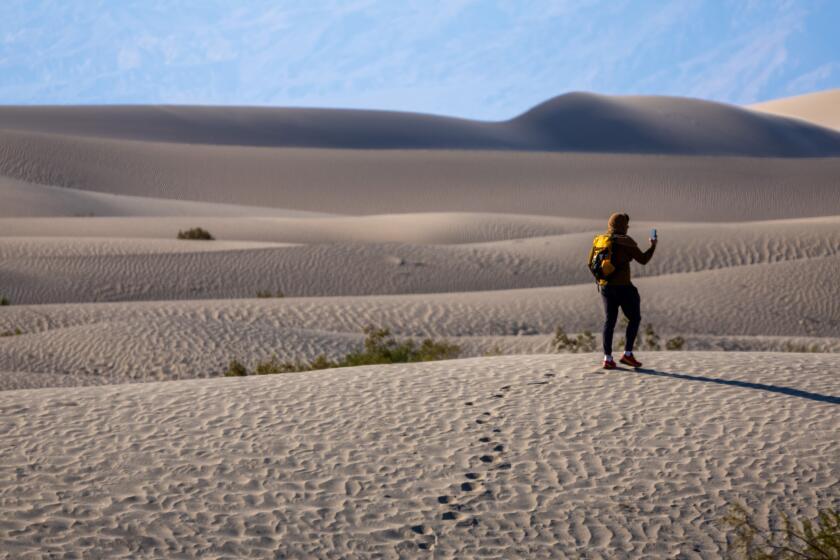According to a National Park Service news release, the 42-year-old Belgian tourist was taking a short walk Saturday in the Mesquite Flat Sand Dunes in 123-degree heat when he either broke or lost his flip-flops, putting his feet into direct contact with the desert ground. The result: third-degree burns.
“The skin was melted off his foot,” said Death Valley National Park Service Ranger Gia Ponce. “The ground can be much hotter — 170, 180 [degrees]. Sometimes up into the 200 range.”
Unable to get out on his own and in extreme pain, the man and his family recruited other park visitors to help; together, the group carried him to the sand dunes parking lot, where park rangers assessed his injuries.
Though they wanted a helicopter to fly him out, helicopters can’t generate enough lift to fly in the heat-thinned air over the hottest parts of Death Valley, officials said. So park rangers summoned an ambulance that took him to higher ground, where it was a cooler 109 degrees and he could then be flown out.



While I fully agree with you, for a second there I wondered what could have been proper clothing and footwear for this type of trip. I normally wear Chaco sandals in the Summer and they seem to be sturdier and more appropriate footwear for this walk and then I thought they could melt too, so… Hiking boots? Those would possibly not melt, so maybe they would have been appropriate, but I’m not sure…
A strange game, the only winning move is not to play… You don’t go to Death Valley in the boiling hot summer (I myself have been in June of many years ago and it was a chillier day)
It’s Death Valley.
You want at least mid-rise hiking boots. Trail hiking shoes might be okay, except in the case you step on a rattler.
The boots aren’t full proof protection but they’re much better than a sock.
The biggest reason to go down to shoes is if you plan to be moving over boulders- it’s pretty hard to edge.
Biggest things are that they’re comfortable, sized right and sturdy enough to not fall apart. (Also? Bring lots of socks. Swapping socks frequently will help with the perspiration)
(ETA) For general clothing avoid dark or bright colors- light tan is best, wear light breathable pants and similar shirt. Id recommend avoiding cotton (it sucks for wicking,) and go with linen. I recommend long sleeves but a lot of that has to do with me having 3 shades- white, pink and burnt.
Hat and sunglasses that are comfortable.
Also? The biggest rule? Tell someone where you are going, what your route is, and when you expect to get out. I recommend checking in and out with the parks service cuz they’re gonna be the ones looking for you.
You’ve gone straight to hiking though and are talking about crossing boulders, thats a world away from what happened here. It says he took a short walk from the carpark, likely a footpath to a scenic view, the path is probably suitable for kids and old people. It did say he was with family and other tourists carried him to the carpark so this was not a trek or hike, it was a brief walk
I think the story here isn’t ‘idiot fails to prepare for hike’ it’s more like ‘hot sand can be more dangerous than you think’ which is important because I would never go hiking unprepared but I would take a short walk to look at the view without really considering the possibility that the sand will melt my feet off.
Do rattlers even live in death valley? I’m not sure that they do.
the Mojave Rattler, Mojave Sidwinder Rattler, and Panamint Rattler all can be found there.
There’s other venomous snakes, too, on that list. It’s not a place you want to go about in sandals. not. at. all. There’s also plenty of nasty spiders and scorpions, too. (to be fair, there’s basically scorpions everywhere. except like. the artic)
Huh. There being scorpions everywhere except the Arctic is such a wild statement to your average European. Never have I ever seen a scorpion outside a terrarium despite having traveled and hiked extensively in various countries around the continent.
Are they truly that common in the Americas, even in more temperate climates?
They’re that common basically everywhere, actually.
The UK has yellow tailed scorpions from southern Europe; and with climate change spreading a lot. Northern Europe is still close enough to the artic to give them difficulties; but there’s other species that are smaller that are just hard to find.
There’s also tons of pseudoscorpids that lack the tail (and are tiny,)
Ah. Well, perhaps I ought to amend it to an average Northern European, then. There are definitely no true scorpions in the Nordics, although we probably have some tiny pseudoscorpids around somewhere. Although I’ve hiked all over Southern Spain and never spotted a scorpion there either.
…which probably says more about my perceptiveness or lack-there-of than anything else.
/edited for spelling
They’re pretty hard to see. Researchers go out at night with UV lights to make them glow in the dark. Otherwise they’re very sneaky.
They’re pretty much restricted to temperate though so nordics are definitely too cold.
But they’ll be coming for you soon, /sadlol
Interesting anecdote. I’m a European-American; members of my family and I have all seen scorpions in Spain, Italy, and especially Greece - all you need to do is stroll through a village at night. As for the US, I’ve never seen one outside a terrarium.